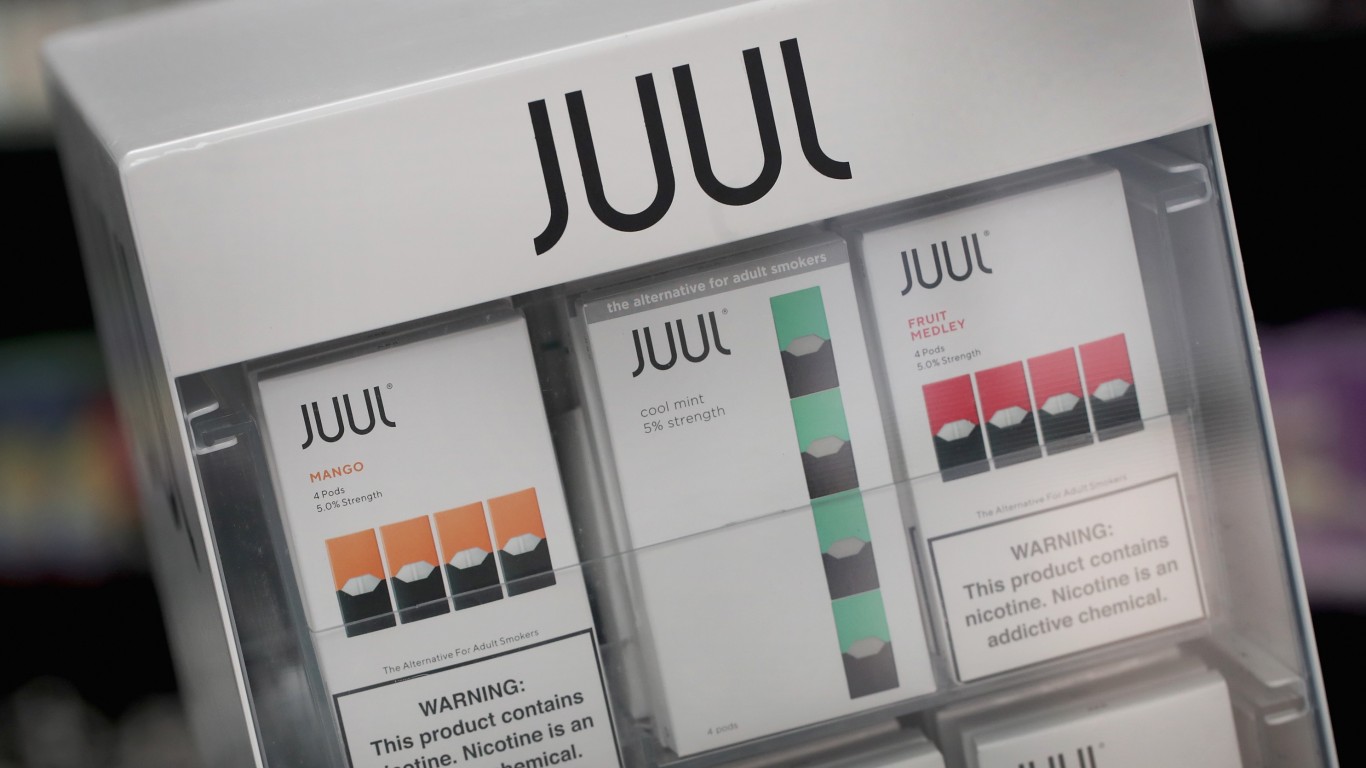
Altria Group Inc. (NYSE: MO) investors will want to note the latest setbacks for Juul Labs Inc., the e-cigarette manufacturer.
This week, Juul said it’s cutting about a third of its staff and moving its headquarters from San Francisco to Washington, D.C. Beset by regulatory troubles around the globe, the company is also pulling back in Europe.
To tap into the growing market for cigarette alternatives, Altria bought a 35% stake in Juul back in 2018 for $12.8 billion. But this smoking-of-the-future dream may be going up in smoke. Before this week’s negative news, the tobacco giant was already battling a federal antitrust case against its Juul investment.
In an SEC filing, Altria admitted, “Regardless of whether antitrust clearance is obtained, the expected benefits of the Juul transaction may not materialize in the expected manner or timeframe or at all.” Altria pointed to the risks of further regulation, adverse publicity around the health effects of vaping, and numerous lawsuits against Juul.
Altria was trading around $35.75 Thursday, while being down 28.22% year to date.
The Allure of Vaping
According to the Centers for Disease Control and Prevention (CDC), 13.7% of Americans smoked cigarettes in 2018, down from 20.9% in 2005. Many smokers looking to quit moved to vaping, assuming that e-cigarettes are safer since they don’t involve all the toxic chemicals created by burning conventional cigarettes. The Food and Drug Administration sees potential health benefits for smokers who switch to e-cigarettes, but stops short of calling the practice “safe” and says more study is needed.
Some have encouraged vaping as an interim step to quitting smoking altogether. But manufacturers are betting that vaping will become a long-term or life-long habit for many.
Trouble arose last year with reports of mysterious lung ailments among vapers, including many young people. As of February, the CDC confirmed over 2,800 cases and 68 deaths. The FDA recently said it “remains deeply concerned about these respiratory illnesses and deaths and is working closely with the CDC, as well as state and local public health partners, to investigate them as quickly as possible.”
Regulatory Heat
While Juul hasn’t been directly implicated by authorities in these cases, they point to the overall regulatory skepticism faced by e-cigarette manufacturers in the U.S. and abroad. Juul is pulling out of South Korea and considering its options in France, Spain and several other European countries where regulators have restricted the amount of nicotine allowed in vapes and enacted other stringent rules.
“This may feel like a retreat from the international market, but it is not,” said K.C. Crosthwaite, Juul CEO in a note to employees this week. “Rather, it is about setting the company up for long-term success. We will no longer scale for the sake of expansion.” Crosthwaite is a former Altria executive.
Stateside, Juul also faces growing regulatory heat. Moving its headquarters is seen as a way to get closer to regulators and legislators in Washington, where the company is fighting allegations that its marketing efforts targeted youth.
Juul stopped manufacturing fruit- and mint-flavored pods after advocates claimed they made the product more attractive to teenagers. The FDA later banned the sale of these flavored products from all manufacturers.
CDC publications warn parents and educators about teen use of e-cigarettes, which teachers might not notice since they can be shaped like USB drives. The regulator notes that electronic cigarette use has eclipsed conventional cigarette use among high schoolers. Some 11.7% of those students are using e-cigs, compared with 7.6% using regular cigarettes. “Approximately two-thirds of Juul users aged 15 – 24 do not know that Juul always contains nicotine,” the CDC reported.
The Antitrust Issue
Hanging over this week’s news about Juul is a much bigger concern for Altria. On April 1, the Federal Trade Commission filed an administrative complaint challenging Altria’s minority investment in Juul.
According to the FTC, Altria and Juul had been competitors until Altria ditched its MarkTen brand of e-cigarettes and made its investment in Juul. According to the FTC’s Ian Conner, “Altria and Juul turned from competitors to collaborators by eliminating competition and sharing in Juul’s profits.”
The first hearing is scheduled for January 2021, and in a press release Altria said the company was “disappointed with the FTC’s decision [and believes it has] a strong defense and will vigorously defend our investment.”
Altria notes that the FTC case won’t be resolved quickly. “By the time we get through the hearing and get through the Commission and any appeal, easily that’s a process that could take two to three years,” said Altria General Counsel Murray Garnick in a conference call to discuss Q1 2020 results.
In the same call, Altria CEO Billy Gifford remained bullish on “non-combustible” tobacco. “We do believe e-vapor will play an important role going forward, as it goes through, I’ll call it, a two to three year speed bump as the e-vapor manufacturers are navigating the FDA submissions and approvals and all of that process.”
Besides Altria’s Juul investment, Gifford pointed to its own tobacco heating product, IQOS, sold by subsidiary Philip Morris USA in select markets. The company faced a coronavirus impact here, with its IQOS retail stores closed and person-to-person marketing halted for now. But Altria still expects this product to do well as it rolls it out nationally.
Are You Ahead, or Behind on Retirement?
If you’re one of the over 4 Million Americans set to retire this year, you may want to pay attention. Many people have worked their whole lives preparing to retire without ever knowing the answer to the most important question: am I ahead, or behind on my goals?
Don’t make the same mistake. It’s an easy question to answer. A quick conversation with a financial advisor can help you unpack your savings, spending, and goals for your money. With Zoe Financial’s free matching tool, you can connect with trusted financial advisors in minutes.
Why wait? Click here to get started today!
Thank you for reading! Have some feedback for us?
Contact the 24/7 Wall St. editorial team.
 24/7 Wall St.
24/7 Wall St.

